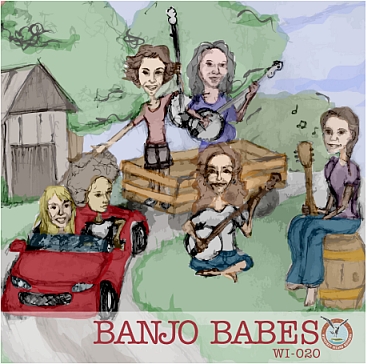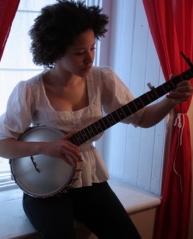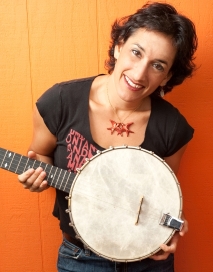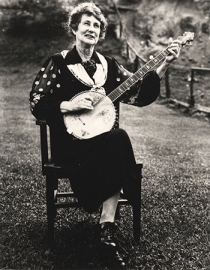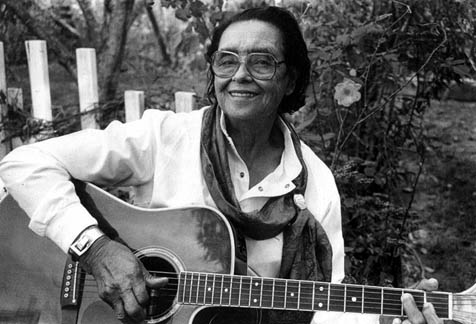

Click here to order the CD
About the playersI have to be careful doing these notes. These Babes is all banjo plunkers, and you know that's a dangerous breed. They carry something openly, these sisters, that their foremothers weren't much allowed to, this playing of the banjo, and they do it well and proudly, from the youngest to the oldest. I know them all, and if my word is good for anything, it's good for that. Ask the ghosts of Tom Ashley and Horton Barker how they learned to play. They'll tell you it was their sister, their mother, their aunt, who showed them how to plunk that thing. Dock Boggs, before he got to picking blues in ingenious tunings, clawhammered like his sister did, Hook and Line, tunes like that. Great as he was, he stood on his sister's shoulders first. Grandpa Jones looked over Cousin Emmy's shoulder for so long, she finally broke down and showed him what to do. Earl Scruggs's sister played, but didn't play out. Lilly Mae Ledford, who was a fiddler first, was prevailed upon to dress up old fashioned and play the banjo instead. She had to run away from home to do it, but she did it, to her great credit and our good fortune. To his own credit, that early feminist Pete Seeger always publicly acknowledged Samantha Bumgarner as a main source. And of course, there was Ola Belle Reed. I could go on, but you get the idea. All these women played the slave instrument first, a cheese hoop with a catskin tacked to it, or a gourd and gopher combo, strung with fishing line or screen door wire. The ones we know about emerged from the great rural southeastern bed of traditional music, where women and men wanted only to tickle themselves and those around them with a little tune. The ones we don't know far outnumber the ones we do, more's the pity. But they carried their brothers as surely as they carried their traditions. Well, you can't stop them any more. They won't be tied down, held down, squelched by moribund custom or Dow's newest product, Banjo-B-Gone. A banjo is essentially a drum with a stick through it, so it's a good thing to beat your joys and frustrations out on. As the world sailed asymptotically through the Industrial Revolution, banjos sailed along with it, changing as they went. They've changed the world some in the process. Elaborating from the tack-head to the Tub-A-Phone in just over a hundred years, banjos insinuated themselves into every corner of American life. Expanding their purview from a slave's Sabbath novelty to a dominant force in the music of most every ethnic groups. A hundred makers modified their shape, size and decoration as they went. These Babes are aware of this, and treat it accordingly. Long story short, they are rooted and therefore they are licensed to recombine, innovate and make anew. Kaia, the babe of Babes, is eighteen, and the whole world just recently opened up to her in the form of a banjo. I asked her if she knew about Joe Thompson, the last surviving old- time Black fiddler. She did. Then I asked her if she was ready to take up the burden of preserving his and his banjo playing cousin Odell's music, and she said she was. I almost cried. You can't go anywhere if you don't know where you've been, and she knew from the get-go. These Babes are broadly rooted in Appalachian traditions, but Aubrey is experimenting with hard Country Blues, like Gus Cannon did; Evie and Hillary compose new tunes, like Rufus Crisp; Lauren is attracted to African American 'old-time,' like Etta Baker and Algia Mae Hinton; Dale just plays whatever she wants. Kaia is combining Old Time Music with Rap! Traditional Musics, plural, are local vernaculars preserved, jutting into modern life making little bridges. It doesn't have to be great art, collectively, but it does have to work. Ideally this music stabilizes the culture around it the way prairie grass stabilizes forty feet of rich prairie soil. If there is an America, and it has a Folk Music, it all belongs to everybody, right? The Babes' claim on it is, well, just don't mess with it. Ain't none of them going to get rich playing the banjo, but we are the richer for them playing it. They are part of that history now, and so will their daughters and sons be. –Andy Cohen, Memphis, September 2012. About the music(Click on any title to hear a sample)
1. Little Orchid (Hilary Hawke, A.S.C.A.P.); 2;13
This is an up-tempo, old-time kind of finger picking tune with lyrics about being unable to keep a fragile orchid fower alive. Its catchy melody keeps the tune lighthearted, while the lyrics draw parallels between the orchid and how careless people can be even when they mean well. – Andy Cohen 2. When I Go to West Virginia (Aubrey Atwater, BMI); 4:28 Originally recorded in 1997, this song was inspired by Aubrey's family history of owning and operating coal mines in the early 1900s. The Atwater Coal Company transported coal from Blue feld, West Virginia to the Fall River knitting mills in Massachusetts. This song took months to write because she wanted to deal with controversial issues in a way respectful to her family. Her father was especially generous in sharing family history. – Andy Cohen 3. Precious Days (Evie Ladin BMI); 3:54 "I wanted to write a song with my mother in mind. She had been sick for most of my life till she passed in 2008. She was a woman so full of life, a teacher, a dancer. As her body failed her, she always woke with a smile on her face. I asked her what she was so happy about, and she said "I'm just very happy to be here every day." These are precious days we have together. The song also became about the planet we are very rapidly killing - the earth also known as our mother - and how we are set the task of taking care of it until she dies. We're not doing a very good job of it. These are precious days." – Evie Ladin "A blend of Algia Mae Hinton's version and Joe Thompson's fddle feel, I try to imagine Odell (Joe's cousin) playing banjo. I added a few ideas from Greg Clarke of Portland with whom I used to play the song." – Lauren Sheehan 5. Boatman (Dale Robin Goodman, Traditional); 2:30 "I learned this, I can't remember when or how. I've been singing it forever. It's folk music, ya know!" – Dale Robin Goodman 6. Rappin' Shady Grove (Kaia Kater/Traditional); 3:08 Rap is a much older form even than blues, though you'd never know it listening to contemporary radio. Here Kaia makes use of two old forms and an old song to cook up a fresh treatment on the oldest of themes. – Andy Cohen "My husband/musical partner Elwood Donnelly learned this song years ago and then I took an interest in singing lead. I enjoy singing this song, which is somewhat outside of my realm." – Aubrey Atwater 8. Willie Moore (Lauren Sheehan, Traditional); 3:43 "A straight ahead version of an old ballad with a lovely melody that sits well on the banjo." – Lauren Sheehan 9. Greasy Goat (Hilary Hawke, ASCAP); 1:37 The pun in the title (A play on the traditional tune "Greasy Coat") speaks to an abiding sense of humor that overlays a fervently respectful regard for the origins of the music and its players. Old-time fun! – Andy Cohen 10. I Love My Honey (Evie Ladin: public domain, arr. Evie Ladin/Keith Terry); 2:48 "I heard a Field Recorder's Collective CD of Santford Kelly playing this tune pizzicato on the fiddle and it just sounded like a great banjo tune to me. It changed in my memory of it (as all good traditional music does); with its whoops and shouts, no better way to express both love and parting. Keith Terry's percussion brings out the musics African roots, and his hands on the wood cajón sound like clogging to me. One of my favorites to sing, having elicited the surprised and satisfied audience comment, 'I thought I hated banjo!' " – Evie Ladin 11. High On A Mountain (Dale Robin Goodman {Ola Belle Reid}); 2:37 Dale learned this in North Carolina, not knowing who wrote it, but was entranced by its poetry. She later looked up who Ola Belle was, and confirmed her admiration. She said, "Ola Belle loved music and took in stray kids. At the time I was working with children. I love music, and I love kids too." – Andy Cohen 12. Maggie May (Kaia Kater); 4:04 Subordinating a deep conga drum and a cello to the banjo's trill shows off its power. Kaia wrote and arranged this stark little opus. – Andy Cohen An energetic banjo tune is played in fingerpicking style, influenced by the late Earl Scruggs. Hilary writes that the tune is based on a descending chromatic lick at the beginning of the song, and she wanted it to sound like a traditional tune played in a bluegrass style with a lot of fun banjo licks. – Andy Cohen Credits
1, 5, 9, 13 recorded at Sounds Interesting Studios, Middleboro, MA Tracks & Times1. Little Orchid (Hilary Hawke) 2:13 |
--------------------------------------------------------  © Copyright 2003-, Wepecket Island Records, Inc. All rights reserved. Host your web site with IPOWER! |














